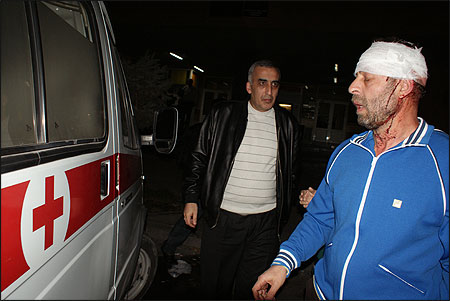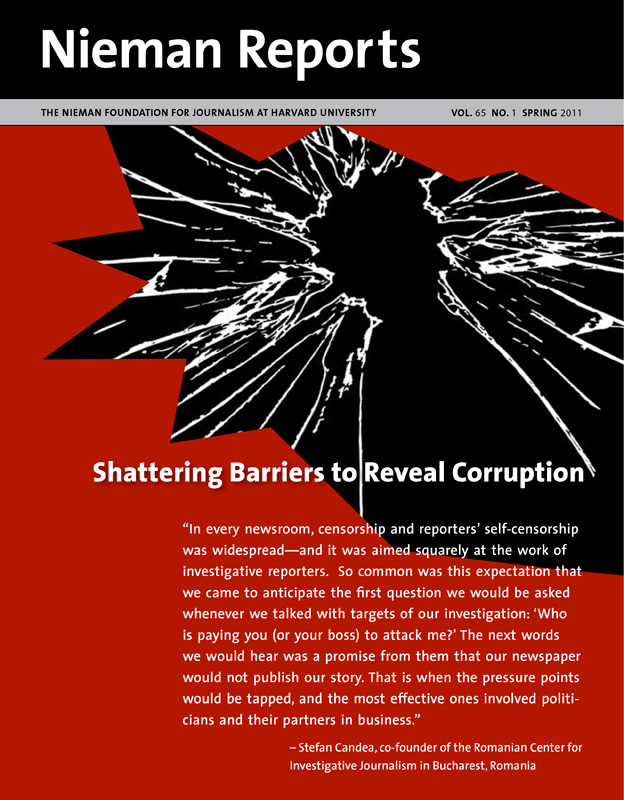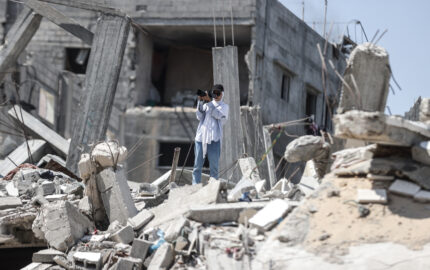
Friends and acquaintances ask me all the time, "What exactly is it that you want? What do you expect to achieve with all your investigative stories?"
My answer is always the same: I want to restore a degree of justice in Armenia, and I want readers of Hetq ("Trace"), the independent Yerevan-based online newspaper where I am editor in chief, to know what we have uncovered.
As investigative reporters, we are like the aquarium fish called the "cleaners" who scour the tank for grit and grime. We carry out this function in society as we try to uncover the dirt and clean it up. At times, we succeed. When we fail, it means we aren't performing our task properly.
Numerous obstacles are placed in our way, and they can seem unconquerable—or at least be daunting enough to discourage any sensible person from trying. Against this backdrop, investigative reporters resemble stray dogs that are kicked and cursed by passersby. In fact, this has happened to some of us. So when your life's work doesn't lead to the results that were envisioned, it's only natural to ponder its value. Is the effort worth it? And then there are the risks to consider—for oneself and family members. They can be summarily fired or not find any work at all when a relative is labeled a "dangerous" reporter.
RELATED LINK
Resources for Investigative ReportersAnother big obstacle to doing investigative journalism is the reluctance of government sources to provide any information. Make an inquiry about abuse of power and months will pass before any reply comes, and then it's often pure claptrap. This is what usually happens despite a law stipulating that government agencies must supply such information within five days and that it must also be posted on their website, made readily available not just to the reporter who requested it but to everyone. Yet my experience tells me that government officials go out of their way to hinder the flow of information to the public. Years ago I couldn't convince an American colleague that decisions made by the Yerevan mayor were off limits not only to residents of the city but to reporters. We obtained copies of those decisions only after a two-year court process.
In 2001, reporters at Hetq uncovered the fact that the Ministry of Health's blood bank included blood from donors infected with HIV. After we published the news, the ministry declared "war" on us and directed staff not to speak to us on any matter. Soon after other news outlets picked up our story, the ministry confessed that it was true. The blood bank's director was fired.
Following Bananas
It is an investigative reporter's job to pry information from government sources and verify it. Figuring out what is accurate can be extremely difficult when agencies release contradictory information in response to the same set of questions. But receiving very different responses can also alert us to suspect practices. This is what happened when we at Hetq requested information about the export of bananas from Armenia. The national statistics service indicated that Ketrin Ltd. had exported nearly 3,600 tons of bananas to the Bahamas during 2005 and 2006. The deputy chairman of the State Customs Committee (SCC) of Armenia responded to the same inquiry with a figure of 866 tons.
We wrote to the SCC deputy chairman about this wide discrepancy. Here is how Colonel A. Afrikyan responded:
We are informing you that in 2005-2006 the "Ketrin Ltd." firm exported 59.44 kilos of banana oil to the Bahamas, an amount equivalent to the 755.4 tons of bananas imported on a temporary basis for reprocessing purposes. According to the Custom's statistical methodology, "the re-exportation, i.e., of reprocessed imports" are considered to be foreign exports and are thus registered as exports of the Republic of Armenia."
When this explanation failed to clarify the situation, we decided to publish the contradictory responses—and then we added that Armenia neither exported bananas or banana oil to the Bahamas, a fact we'd learned from World Bank reports of products traded by countries. In an interview after we published this story, the person who directs the SCC's research and legal affairs department admitted that Ketrin Ltd. had never re-exported bananas or produced banana oil.
However, Ketrin Ltd. was registered as an exporter of several thousand tons of bananas to the Bahamas and to Georgia. Of course, no such export ever took place. Forged documents showing the export of banana oil to the Bahamas were filed to avoid paying various customs and other taxes and levies estimated at a total of $1.5 million.
After an investigation that took five months, we published stories that showed how the owners of Ketrin Ltd. who were top government officials—the deputy chief of the National Security Service and the head of the Compulsory Enforcement Service—were involved in the swindle.
The Armenian press widely covered the banana export story for several months. In our editorials we even suggested that the prime minister's supervisory division—a sort of government accountability office—study the matter. But our efforts came to naught. The officials involved had too much sway.
There was one result related to our investigation: The amount of bananas being imported into Armenia, of which half was going unreported, began to be recorded and the importing company started to pay the required taxes. Two years after our story was published, I had the occasion to speak to the Armenian prime minister during a private meeting. When I told him that our investigation had been ineffective, given that the government wasn't taking appropriate measures based on the revelations we had published, he responded that on the contrary the banana exposé had brought $3 million into state coffers.

Absorbing the Pressures
I am always asked about the pressures brought to bear on reporters. I usually avoid responding since I don't feel that reporters face greater pressure than lawyers or even average folks. Pressures exist in our line of work and are applied in a variety of ways—physical assault, offers of bribes, the performing of favors, the threat of being sued for publishing information, and the problems involved with broadcasting or publishing investigative pieces. We constantly face difficulties, from dealing with law enforcement agencies to obtaining clarifications from government officials.
Society and the press in Armenia are highly politicized, and any incident can quickly become politicized. At Hetq, we have never worn the colors of any political team, and we have an unwritten understanding in our office not to speak about these pressures if they aren't life threatening; our problems remain within our office walls.
In 2002 we couldn't get any TV station to broadcast what we had uncovered about a murder in the army. The courts had sentenced a soldier to 14 years, but we had come up with evidence that he wasn't the murderer. Our seven-month investigation proved why the soldier in question could not have committed the crime. We had discovered that the state's investigators and military authorities literally beat a confession out of him and his testimony was provided under duress. We also illuminated the violations that military prosecutors made in the case and their contradictory rulings. It was only after Internews Armenia selected it as the best investigative film and I challenged the TV officials attending the ceremony to broadcast the film that it finally was shown—at noon on a weekday.
Suffering a Beating
Covering the inner workings of the criminal world and revealing its ties to members of the government's ruling elite is a dangerous proposition. On the evening of November 17, 2008, three people attacked me after I left the office and headed for my car. I momentarily lost consciousness from a blow to the back of my head. A policeman who was passing by fired shots in the air to chase off my assailants. One of them was arrested a few days later and he is now serving a five-year prison term. He had links to the former environment minister.
Prior to the attack, I had published a series of investigative articles regarding the business dealings of that minister, who had granted exploratory mining licenses to his family members and friends. They later sold them for millions of dollars. The police never found the other two assailants or the person who ordered it, though I have no doubt that the former minister was behind the attack. We presented evidence in court that on the day of the attack the young man on trial had placed four calls to the minister's cell phone. The court paid no attention to this evidence, given that the minister, then and now, is a member of Parliament and sits on the council of the ruling political party.
Overcoming such challenges and avoiding such dangers isn't easy. But we do our best in the name of our readers—those who get up in the morning and open the paper to see what we have to say about issues of concern to them. I always tell my journalism students that in the end they are only accountable to individual readers. To give them an adequate accounting, stories must be truthful, sincere and accurate.
Edik Baghdasaryan directs the Investigative Journalists of Armenia and is the editor in chief of Hetq, an independent newspaper in Yerevan, Armenia.



